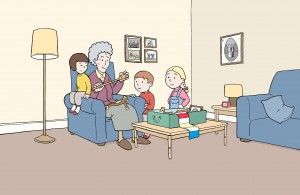Jean Demetris was a primary school teacher for 22 years. 8 years ago her husband was diagnosed with Lewy body dementia. She dealt with many aspects of the condition, the highs and lows, and engaged with the many agencies involved in her husband’s care.
The experience inspired Jean and her illustrator son Alex to create a storybook for young children; to help them understand and talk about dementia with their families. We caught up with them both for a quick chat about the inspiration behind the book and what they hope it will achieve.
Q1. Where did the idea for Grandma’s Box of Memories
come from?
Jean: There were two factors that prompted the idea for the book.
Firstly, when my husband was diagnosed with Lewy Body Dementia I needed information. I found there were plenty of books on dementia for adults and some for teenagers, but hardly any for young children.
Secondly, in my husband’s nursing home I felt there was a need for more activities and stimulation for the residents. This made me think about what could be done to encourage residents’ families and friends to participate with the residents and involve them in engaging activities.
Taking these two factors into consideration, I came up with the idea for the book that would become Grandma’s Box of Memories.
Q2. How did you Alex (Jean’s son) become involved in making the book?
Alex: A few months after Dad died Mum spoke to me about her idea for the book. I liked the sound of it, so we started work on the book’s structure and on sketching out illustrations. Soon we had put together several sample pages and before long we were very pleased to receive a commission for the full version.
I had relatively recently graduated with an MA in Illustration from Camberwell College of the Arts for which my final project had been a comic based on my family’s experiences of Dad’s dementia. Grandma’s Box of Memories represented another opportunity to work on a subject that was close to my heart.
Q3. Do you have any suggestions for people on how to adjust to the changes they are likely to encounter when a family member is affected by dementia?
Jean: My experience is of a family member with Lewy Body Dementia. Different forms of dementia have different characteristics and symptoms, so the adjustments their family and friends may need to make may be different.
Dementia should not be viewed as a stigma. Find out as much as possible about the condition from professionals and support groups. They will be able to advise you on available help and support, so use this to your advantage.
You must accept that you have to adjust to dealing with a changed person. Acknowledge the limitations that dementia can cause in people. Focus on small activities and do not expect too much of the person. Everyday tasks such as using the telephone or cooking will become difficult for people with dementia; safety around the home becomes a priority. Social services should help you to install devices such as gas, water and personal alarms. You can also be creative in helping the person to remain independent using small measures such as sticky notes reminding them to lock doors, close windows, or turn off taps.
If the person with dementia is alone at home it is also helpful to arrange for friends and neighbours to drop by and check they are safe.
Personal hygiene may become problematic as reluctance to bathe or change clothes can take hold, and you may need to help with these tasks. Initially this may cause embarrassment but it can be overcome.
Patience and understanding will win out over confrontation in dealing with situations, and a sense of humour is essential.
Should your family member need residential care, try to help make it a home from home. Enjoy going there and participate in events such as birthday celebrations. Engage with staff and other residents. You will encounter people you would not normally meet, which can be rewarding.
Don’t be upset when acquaintances find it difficult to engage with the person with dementia. Some people will naturally find the situation hard to deal with.
Your lifestyle will change, sometimes quite dramatically. Caring for a person with dementia can be hard work emotionally and physically, but don’t be hard on yourself. Seek help – it’s there, and find time for you. Occasional treats are a must.
Q4. What do you hope young readers will gain from this book?
Jean: Grandma’s Box of Memories is meant to be educational and entertaining; I hope readers will enjoy the story, illustrations and characters.
The book provides children with basic but helpful information about dementia, and invites readers to suggest their own ideas for items to go in a memory box. It might also encourage children to be creative and come up with ideas of their own to support people with dementia.
Hopefully, it will help children understand that they can be part of the caring process and share their feelings and ideas with family members.
Q5. What should parents remember when they are explaining dementia to younger children?
Jean: Children will be aware that something is wrong but will normally accept the diagnosis of dementia given the appropriate support. It is natural for an adult to want to protect the child yet is important to explain what is going on in a calm and clear way. A child may experience a range of emotions, such as sadness, anxiety, anger and confusion, and will need reassurance that adults are there for them and can offer them time for discussion, both talking and listening and encouragement to ask questions.
It is important that the child understands that dementia cannot be cured but there are ways to help the person feel loved and wanted.
Q6. How can children be involved in the care of family members?
Jean: Most obviously, children can pay frequent visits to the person with dementia. During these visits they can look at books and photos with the person, chat with them, listen to music and sing and dance, draw pictures, or do simple jigsaws. They can also share small treats such as sweets and biscuits and help to peel and share pieces of fruit.
Outings to places like local parks are another way that children can be involved in caring for someone with dementia. Sharing simple outdoor activities like playing catch or feeding ducks is fun for everybody.
Please note: if you are in the US or Canada, you can view the book information page and order your copy here.
